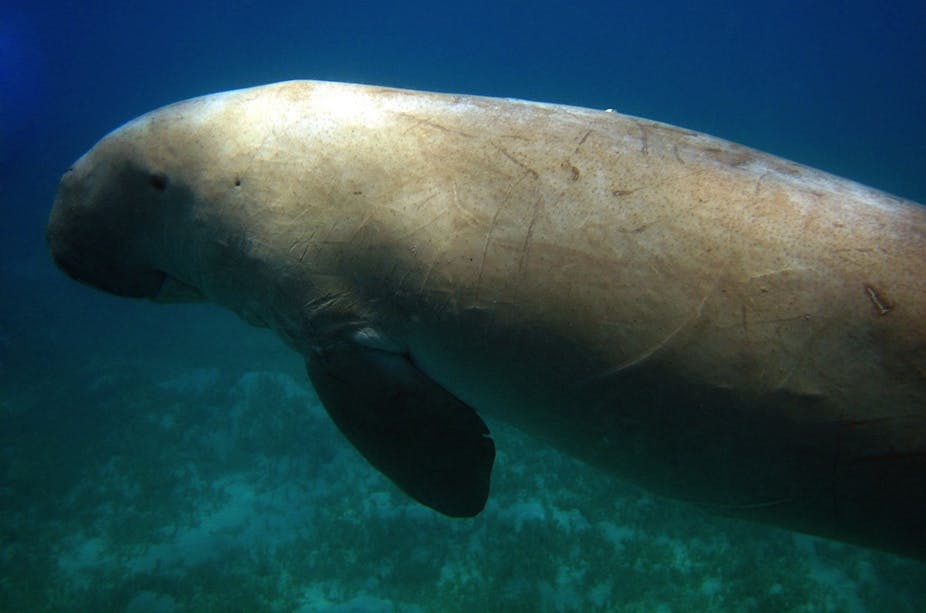Many Australians are rightly appalled by the slaughter conducted by the Japanese whaling fleet under the guise of “scientific research”. This is not only because whaling is cruel but also because whales are iconic, have high mammalian intelligence and are endangered due to historic over-hunting. Whale meat is also unnecessary for human existence, no matter what veneers of cultural labels are attached to this activity. We either don’t believe the Japanese cultural argument or, if we are prepared to accept that it is tradition, we think the Japanese need to get over it.
Australians love whales, but what about the other large, iconic sea-mammal killed cruelly and unsustainably, as a cultural practice – this time in our northern waters? Why does dugong hunting not concern us?
Cruel and unsustainable
Every year in Australian waters, thousands of dugongs are speared, dragged by the spear line and then drowned in a process that takes between 15 minutes and two hours. While we deplore the use of harpoons by Japanese whalers, regulations made under the Torres Strait Fisheries Act prohibit the taking of dugongs by any method other than with the use of a spear thrown by hand.
Even though the Queensland Animal Care and Protection Act was recently amended to provide that traditional killing be “done in a way that causes the animal as little pain as is reasonable”, the harpooning and drowning of dugongs will continue to be considered reasonable under the law since it is the only authorised option, at least in the Torres Strait where the majority of the hunting takes place.
The Dugong and Turtle Knowledge Handbook (pp. 51-53) indicates that there is little reliable information on the number of dugongs hunted in Australian waters but that the number killed in the Torres Strait approaches or exceeds 1000 dugongs per year. According to world-leading dugong experts, legal Indigenous hunting is the greatest source of dugong mortality in northern Australia and is not sustainable in the Torres Strait and Cape York.
Traditional hunting - a legal right
Under section 211 of the Native Title Act, Aboriginal and Torres Strait Islander peoples are entitled to hunt dugongs for personal, domestic or non-commercial communal needs. State and Territory laws also allow the practice, but this right is not unfettered. Both the Commonwealth and the States have the power to regulate the killing of dugongs to ensure its sustainability. In addition, the States can regulate hunting to ensure it is conducted humanely. Yet these powers have not been exercised in a meaningful way.
Since native title rights do not extend to commercial activities, serious allegations of a substantial black market in dugong meat from the Torres Strait Islands to Islanders living on mainland Australia concerning. Given the remoteness of the Torres Strait, adequate law enforcement in relation to dugong hunting is difficult to maintain.
Cultural excuse
Much of the laissez-faire dugong management in Australia has been based on the deeply-rooted principle that Aboriginal and Torres Strait Islander peoples know best and that their practices are sustainable. It is time however to set aside romanticised beliefs of Indigenous people as good custodians of the land merely by virtue of their race or ancestry.
Indigenous and non-indigenous peoples all over the world have exploited their environment, sometimes causing mass extinctions. It is now well accepted that over-hunting by Indigenous peoples caused, or at least significantly contributed to, the extinction of the mega-fauna in Australia and of the moa in New Zealand as well as of Steller’s sea cow, a species related to the dugong, in the North Pacific.
People are people, and eat what they can, when they can. It is the history of humanity. Pre-European contact, Indigenous Australians would only have been able to hunt small numbers of dugongs - because it was arduous to do so in dugout canoes. Nowadays, with boats equipped with outboard motors, hunters go faster and further out to sea and are capable of killing the animals in larger numbers.
Pregnant dugongs were and still are targeted because people like the taste of their fatty meat better, and young calves are routinely killed, even though killing the next generation before it has had time to reproduce is the antithesis of sustainability.
Cultural change
Dugong hunting is justified because of its cultural and social value. But culture is fluid and changes with time. Dog fighting, bear baiting and sending children down the mines are no longer part of Western culture because these practices offend our morals. Indigenous cultures change too. For instance the marriage of underage girls is no longer tolerated in Indigenous communities.
Some Indigenous communities have discontinued traditional hunting of dugongs and turtles already because they understand that this practice is no longer sustainable. When a cultural practice is inconsistent with human rights, sustainability, humane standards, or with other deeply entrenched principles, it is time to ask whether that practice is worth maintaining.
People are rightly upset about the barbaric Japanese whale slaughter. Dugongs, harpooned and forced to suffer as much if not more than the whales and killed at unsustainable rates, deserve the same concern and outrage. If it cannot be conducted in a manner that is both sustainable and humane, dugong hunting, along with whale hunting, must stop.
Ideally people of the Torres Strait will follow the example of progressive Indigenous communities and stop dugong hunting before it is too late. If not it will require State and Commonwealth governments to introduce strict quotas and standards of humaneness to meet community concerns. Importantly, enforcement mechanisms will need to be substantially improved.

